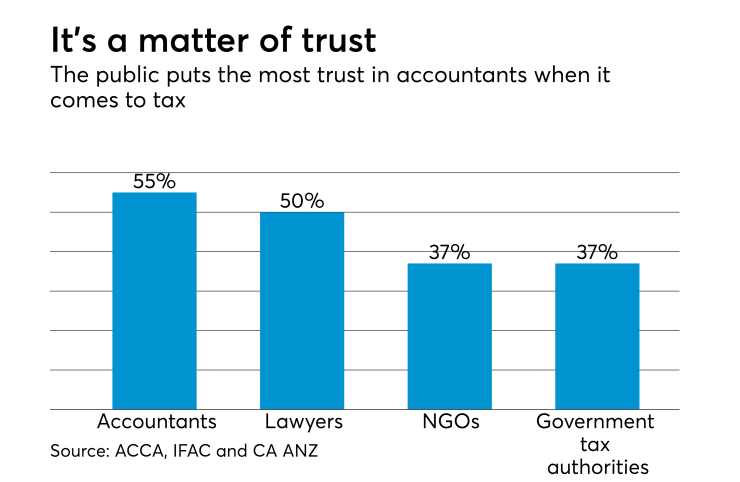A new report from a trio of international accounting organizations finds a high level of distrust by the public globally in politicians and nongovernmental organizations when it comes to their nations’ tax systems, but a comparatively high level of trust in professionals such as accountants and (gasp!) lawyers.
The
The concerns about inequality stem from a perception in English-speaking countries that high-income earners and multinationals are treated better by tax systems than average or low income earners. In contrast, survey respondents in China, Indonesia and India had high levels of trust in tax authorities, politicians and accountants, while reporting efficient tax filing and supporting more tax competition to attract multinational business.
In general, the survey respondents indicated a trust deficit in politicians and the media, with 58 percent of the respondents expressing distrust or strong distrust in politicians, down 9 percentage points since 2017. Similarly, 37 percent of the respondents expressed distrust in the media, but that was down 4 percentage since the last survey in 2017.
The highest level of trust was expressed in professional tax accountants. at 55 percent, but that was down 2 percentage points compared to 2017, while trust in professional tax lawyers was 50 percent, up 1 percentage point.

“Given that accountants adhere to a strong ethical code that supports their public interest obligations, it’s vital that we actually understand what the public thinks of tax systems and who they go to for trusted advice,” said IFAC CEO Kevin Dancey in a statement. “This research gives everyone working in tax, including policy makers, politicians, media and accountants, a powerful insight in what the public really think. By understanding their views, professionals can better work to inspire confidence in the system as a whole.”
The survey indicated consistent levels of mistrust year over year in NGOs at 37 percent, an increase of 2 percentage points compared to 2017.
Views were mixed when it came to trust in government tax authorities, with 37 percent of the respondents saying they trust or highly trust tax authorities and 34 percent distrusting or highly distrusting them.
“Once trust is lost, it’s hard to regain,” said Chas Roy-Chowdhury, global head of tax at ACCA, in a statement. “Tax is a complex issue and one that touches all our lives — so that trust is important. What’s clear from this research is the need for all significant players — from politicians to tax experts — to work together to build and sustain the public’s trust in tax. And while the accountancy profession fares the best again in this year’s results, we cannot be complacent about these findings.”
Meanwhile, skepticism abounds in public institutions. “Our research shows that people say they broadly trust and want to hear more from experts and professionals, but skepticism in politicians and the media continues,” concluded Michael Croker, tax leader for Australia at CA ANZ. “If transparency is one of the pillars of an effective tax system, then the professionals and experts working in tax need to strive for even more clarity on how tax works nation.”





